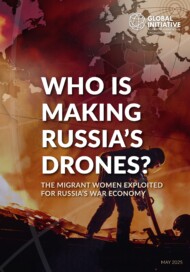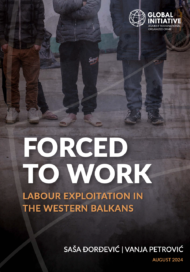The Alabuga Special Economic Zone (SEZ), located in the Republic of Tatarstan in south-west Russia, plays a major role in Russia’s war economy. Thousands of attack and reconnaissance drones are produced at the site for use by the Russian military. Reports in 2023 by independent Russian and Western media raised concerns about exploitative aspects of a recruitment programme connected to the SEZ, known as Alabuga Start. This programme has reportedly relied on underage students from Alabuga Polytech and young migrant women from across the globe to staff its drone production facilities.
Initially targeting African countries, Alabuga Start expanded to recruit women aged 18–22 from Latin America, South Asia, and former Soviet countries. Reports found that participants were not informed they would be working in weapons production before arriving at the site. Some believed they were joining a work-study programme. Testimonies described long hours, constant surveillance, and health issues caused by exposure to caustic chemicals. According to whistle-blowers at Alabuga Polytech, workers faced punitive management and harsh conditions.
Recruitment was reportedly carried out online, including through social media and influencers, and with the help of local intermediaries in countries of origin. Many recruits work directly in drone production, while others are employed as cleaners and caterers. Some testimonies revealed experiences of harassment, racism, and excessive surveillance by SEZ management. Ukrainian drones have targeted the SEZ site, bringing the recruits into proximity with the Russia–Ukraine conflict without their informed consent.
Although the SEZ is presented as a private enterprise, it has close links to the Russian state. The Ministry of Defence is both the financial backer and end customer for the drones, and the SEZ is owned by a department of the Republic of Tatarstan. Alabuga represents a clear example of how business, criminality and the state intersect in the grey zone described in the report.
The study found evidence of exploitation within Alabuga Start, including the use of misleading recruitment and repressive working conditions. These findings have led some governments to question the programme and take steps to protect their citizens. The report calls attention to the need for further investigation and response from countries of origin and the international community, to prevent young migrant women from continuing to be exploited in support of Russia’s war economy.
Qui frabrique les drones russes ? Les migrantes explotées pour l’économie de guerre de la Russie
La Zone économique spéciale (ZES) d’Alabuga, située dans la République du Tatarstan, au sud-ouest de la Russie, joue un rôle central dans l’économie de guerre russe. Des milliers de drones d’attaque et de reconnaissance y sont produits pour l’armée russe. Dès 2023, des médias indépendants russes et occidentaux ont alerté sur les aspects abusifs d’un programme de recrutement lié à la ZES, connu sous le nom d’Alabuga Start. Ce programme repose notamment sur le recours à des étudiants mineurs d’Alabuga Polytech et à de jeunes femmes migrantes venues du monde entier pour travailler dans ses usines de drones.
D’abord tourné vers l’Afrique, Alabuga Start s’est élargi pour recruter des femmes âgées de 18 à 22 ans, originaires d’Amérique latine, d’Asie du Sud et d’anciens pays soviétiques. Plusieurs témoignages ont révélé que les participantes n’étaient pas informées qu’elles travailleraient dans la production d’armement avant leur arrivée sur le site. Certaines pensaient intégrer un programme de formation en alternance. Des recrues ont décrit de longues heures de travail, une surveillance constante et des problèmes de santé liés à la manipulation de produits chimiques corrosifs. Des lanceurs d’alerte au sein d’Alabuga Polytech évoquent des méthodes managériales répressives et des conditions de travail particulièrement dures.
Le recrutement se fait essentiellement en ligne, notamment via les réseaux sociaux et des influenceurs, mais aussi par l’intermédiaire de partenaires locaux dans les pays d’origine. La plupart des recrues participent directement à la production de drones ; d’autres occupent des fonctions de nettoyage ou de restauration. Des témoignages rapportent également des cas de harcèlement, de racisme et une surveillance excessive de la part de la direction de la ZES. Les frappes ukrainiennes visant le site exposent ces travailleuses au conflit russo-ukrainien sans qu’elles aient donné leur consentement éclairé.
Bien que la ZES se présente comme une entreprise privée, elle entretient des liens étroits avec l’État russe : le ministère de la Défense finance et achète les drones, et la ZES appartient à un département de la République du Tatarstan. Alabuga illustre ainsi parfaitement l’entrelacement des sphères économique, criminelle et étatique dans la « zone grise » décrite dans ce rapport.
L’enquête a mis en évidence des éléments d’exploitation au sein du programme Alabuga Start, notamment un recrutement trompeur et des conditions de travail relevant de la contrainte. Ces constats ont conduit certains gouvernements à s’interroger sur le programme et à prendre des mesures pour protéger leurs citoyennes. Le rapport souligne la nécessité d’une vigilance accrue de la part des pays d’origine et de la communauté internationale afin d’empêcher que de jeunes migrantes ne soient exploitées pour alimenter l’effort de guerre russe.





